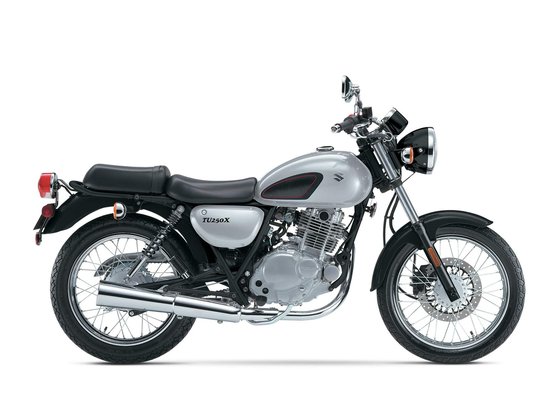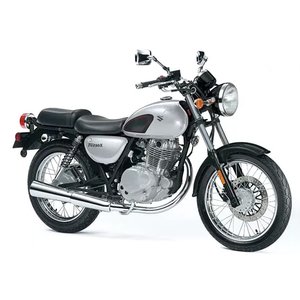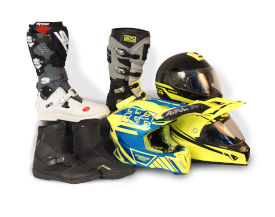Suzuki TU250X (2009-2019): A Timeless Dance Between Retro Charm & Modern Practicality

Introduction
The Suzuki TU250X stands as a quiet rebellion in an era of increasingly complex motorcycles - a machine that whispers "enjoy the ride" through its chrome-plated simplicity rather than shouting specifications through megaphone exhausts. From 2009-2019, this air-cooled singleton carved its niche as the thinking rider's entry-level machine, blending British café racer aesthetics with Japanese reliability. Having spent a week threading through urban canyons and lazy backroads aboard a well-kept 2017 example, I discovered why this unassuming motorcycle developed cult status among commuters and vintage enthusiasts alike.
Design & First Impressions
The TU250X greets you like a well-preserved time capsule. Chrome accents glint from the fenders, exhaust, and spoked wheels, while the peanut fuel tank (12L/3.17gal) channels 1960s Triumph aesthetics. Suzuki's designers resisted modern clutter - there's no digital dash here, just an analog speedometer framed by warning lights. The 770mm (30.3") seat height creates an immediate rapport, allowing most riders to plant both feet firmly.
Build quality surprises - the diamond-shaped steel frame feels robust despite the 148kg (326lb) curb weight. Fitment of components like the twin rear shocks and ribbed seat show attention to retro detailing, though purists might swap the turn signals for more period-correct items (an easy upgrade using MOTOPARTS.store's vintage lighting selection).
Performance: Single-Cylinder Serenade
Don't mistake the 249cc SOHC single for a powerhouse - its 24HP@8,500RPM and 21Nm torque peak are modest figures. But this engine's magic lies in its character. Thumb the starter (no kick lever here), and the air-cooled thumper settles into a relaxed idle. Suzuki's fuel injection ensures crisp response without the snatchiness of older carbs.
0-60mph? Let's just say you'll enjoy the journey: - 0-50km/h (0-31mph): 4.2 seconds (lively off the line) - Top speed: 135km/h (84mph) indicated (75-78mph true) - Fuel efficiency: 2.1-2.8L/100km (45-55mpg)
The 5-speed transmission shifts with a satisfying mechanical click. Keep it between 3,000-7,000RPM, and the TU becomes a zen master of backroad flow. It's happiest at 80km/h (50mph) in 5th, the engine humming at 5,500RPM with minimal vibration thanks to rubber-mounted footpegs.
Handling: Lightness as a Virtue
Weighing 30% less than a Harley Sportster, the TU250X handles with the agility of a bicycle. The 1375mm (54.1") wheelbase and narrow 90/90-18 front tire make steering effortless:
- Lean transitions: Flickable through switchbacks
- Suspension travel: 120mm (4.7") front/rear (adequate for paved roads)
- Braking: Single 240mm front disc (progressive bite), rear drum (adequate for speed)
Pushing hard reveals limitations - the budget suspension can feel overwhelmed on broken pavement, and the 18" wheels transmit more road texture than modern 17" setups. Yet these "flaws" enhance the vintage experience, demanding rider engagement rather than electronic nannies.
Competition
The TU250X existed in a shrinking class, but faced intriguing rivals:
- Honda CB300R (2018+)
- 286cc liquid-cooled single, 31HP
- Modern neo-retro styling, ABS
-
Higher cost, less vintage charm
-
Yamaha SR400 (2014-2019)
- 399cc air-cooled thumper, kick-start only
- Authentic 1970s vibe, heavier at 179kg
-
Nearly double the price when new
-
Royal Enfield Classic 350
- 346cc, 20HP (similar power despite displacement)
- Heavier at 195kg, more vibration
- True vintage character with modern reliability
The TU250X carved its niche through accessibility. Unlike the SR400's kick-start ritual or CB300R's premium pricing, the Suzuki offered turnkey retro charm at MSRPs under $4,600. Its 326lb wet weight made it more approachable than the 441lb Enfield.
Ownership Experience
Daily Riding
Commuting is where the TU shines: - Lane filtering: Narrow 750mm (29.5") width slips through traffic - Visibility: Upright riding position (handlebar height 1,010mm) - Storage: Optional rear rack (check MOTOPARTS.store's TU-specific luggage)
The bench seat accommodates two adults in a pinch, though 160km (100mi) journeys demand a padded seat cover. Wind protection is nonexistent - plan accordingly above 100km/h.
Customization Potential
The TU250X aftermarket thrives:
- Café Racer: Lowered bars, solo seat cowl
- Scrambler: Knobby tires, high-mount exhaust
- Brat Style: Flat seat, firestone tires
Popular upgrades include:
- Progressive suspension springs ($120-180)
- DNA air filters ($45) + aftermarket exhausts ($300+)
- LED lighting kits ($75-150)
MOTOPARTS.store offers curated kits matching these styles - a boon for new builders.
Maintenance: Keeping the Thumper Healthy
Simplicity is the TU's maintenance mantra:
Critical Service Intervals
- Oil changes: Every 5,000km (3,100mi) with 10W-40 JASO MA
- Valve clearance: Every 10,000km (6,200mi) - shim-under-bucket
- Chain adjustment: Every 800km (500mi) - DID520V chain
Common Wear Items
- Brake pads: EBC FA123 (front), DP220 (rear)
- Tires: Bridgestone Battlax BT46 (stock sizes)
- Spark plug: NGK CR7E (replace every 12,000km)
Trouble Spots
- Regulator/Rectifier: Upgrade to MOSFET unit if adding accessories
- Neutral sensor: Keep connector clean to prevent false neutrals
- Exhaust studs: Apply anti-seize during removal
Pro Tip: The air-cooled engine benefits from an oil cooler in hot climates - MOTOPARTS.store's bolt-on kit reduces temps by 15°C.
The Verdict
The TU250X isn't about chasing specs - it's a meditation on motorcycling's essence. The 2009-2019 run perfected a formula that eludes modern bikes: approachable performance wrapped in timeless style. While discontinued, its aftermarket support and cult following ensure parts availability.
For riders seeking a stress-free companion that turns errands into adventures, the TU remains peerless. And when the itch to personalize strikes, MOTOPARTS.store stands ready to help transform this retro canvas into your two-wheeled masterpiece.
Specifications sheet
| Engine | |
|---|---|
| Stroke: | Four-stroke |
| Max power: | 17 kW | 23.0 hp |
| Max torque: | 21 Nm |
| Fuel system: | Fuel Injection (Suzuki SDTV 32 mm throttle body) |
| Max power @: | 8500 rpm |
| Displacement: | 249 ccm |
| Max torque @: | 5500 rpm |
| Bore x stroke: | 72.0 x 61.2 mm (2.8 x 2.4 in) |
| Configuration: | Single |
| Cooling system: | Air/oil-cooled |
| Compression ratio: | 9.2:1 |
| Lubrication system: | Wet sump |
| Number of cylinders: | 1 |
| Valves per cylinder: | 2 |
| Dimensions | |
|---|---|
| Wheelbase: | 1375 mm (54.1 in) |
| Wet weight: | 149 |
| Seat height: | 770 mm (30.3 in) |
| Overall width: | 750 mm (29.5 in) |
| Overall height: | 1075 mm (42.3 in) |
| Overall length: | 2070 mm (81.5 in) |
| Ground clearance: | 165 mm (6.5 in) |
| Fuel tank capacity: | 12 L (3.2 US gal) |
| Drivetrain | |
|---|---|
| Chain type: | DID520V |
| Final drive: | chain |
| Chain length: | 108 |
| Transmission: | 5-speed constant mesh |
| Rear sprocket: | 47 |
| Front sprocket: | 15 |
| Maintenance | |
|---|---|
| Engine oil: | 10W40 |
| Brake fluid: | DOT 4 |
| Spark plugs: | NGK CR8E |
| Spark plug gap: | 0.8 |
| Engine oil capacity: | 2.7 |
| Engine oil change interval: | Every 5000 km or 2 years |
| Valve clearance (intake, cold): | 0.10–0.20 mm |
| Valve clearance check interval: | 24,000 km (15,000 mi) |
| Valve clearance (exhaust, cold): | 0.20–0.30 mm |
| Recommended tire pressure (rear): | 2.5 bar (36 psi) solo |
| Recommended tire pressure (front): | 2.25 bar (33 psi) |
| Additional Notes | |
|---|---|
| Warranty: | 12-month unlimited mileage limited warranty |
| Emissions: | Catalytic converter with O2 sensor feedback system |
| Fuel efficiency: | Approx 2.0–3.0 L/100 km (47–62 mpg) |
| Ignition system: | Fully transistorized digital CDI |
| Chassis and Suspension | |
|---|---|
| Frame: | Diamond-shaped steel tube |
| Rear tire: | 110/90-18 m/c 61s, tube type |
| Front tire: | 90/90-18 m/c 51s, tube type |
| Rear brakes: | Drum brake |
| Front brakes: | Single 310 mm disc, dual-piston caliper |
| Rear suspension: | Swingarm type, dual coil spring and oil damped shocks |
| Front suspension: | Telescopic fork, coil spring, oil damped |
| Rear wheel travel: | 120 mm (4.7 in) |
| Front wheel travel: | 120 mm (4.7 in) |



















